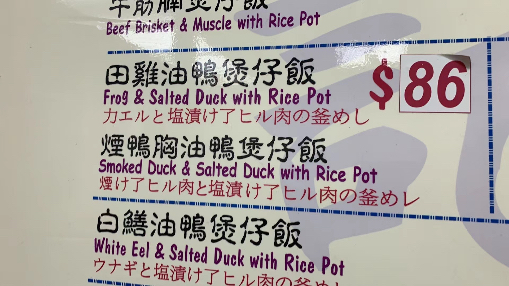Chinesey Japanese in a Hong Kong restaurant
« previous post | next post »
From Zihan Guo:
Yesterday a friend of mine posted this photograph he took in a restaurant called 興記菜館 in Hong Kong. As a Chinese speaker and Japanese learner I find this hilarious.
1) At first I thought the Japanese part was purely the product of google translate, as seen by a mistaken mixture of different writing systems. At the beginning of the first item, the カ in kaeru カエル (frog) is obviously written as a kanji rather than katakana (different font and size). At the end of the second item, the katakana レ in kamamere 釜めレ should be hiragana し as in the first item kamameshi 釜めし (iron pot rice). But when I tried both the Chinese and English in google translate, it turned out differently.
2) What is hilarious to me is the 塩漬け了 in all of them, as a translation for "salted." Shiodzuke 塩漬け sounds correct and can stand on its own. But the translator seems to have added the Chinese aspect marker "le 了" to further indicate the way this dish is prepared (like 塩漬けた, that which has been salted). Huàshétiānzú 畫蛇添足 ("drawing legs on a snake; gilding the lily") (!). I feel that this was a conscious choice made by the translator, almost playfully. My friend commented that it read like someone saying "Wǒ chī-ed fàn 我吃ed飯" in Chinese.
3) Same with the 煙け了 in the second item for "smoked." I love searching for Japanese recipes, but have not yet encountered the expression 煙け. More often I see sumōku スモーク or kunsei 燻製 for "smoked." I might be wrong, but this seems to me like an unhesitating parody of shiodzuke 塩漬け.
My friend is a native Cantonese and a fluent Japanese speaker, now studying in HKU. He told me that he had seen many translations like these in Hong Kong restaurants and billboards.
VHM: Cant. bou1 zai2 faan6 / Mand. bāozǎifàn 煲仔飯 ("clay pot rice")
Selected readings
- "Chinese Japanese" (9/13/15) — "Chapanese"
- "'And the greatest Japanese export to China is…'" (8/21/12)
- "Japanese phonetically rendered in Mandarin pronunciation of Chinese characters" (12/10/13)
- "A French Japanese Chinese restaurant" (11/8/14)
- "Sino-Japanese faux ami" (4/23/17)

Alex DelPriore said,
October 2, 2021 @ 11:23 am
了ヒル is simply a near-homograph error for アヒル "duck", no?
Sven Osterkamp said,
October 2, 2021 @ 12:54 pm
Yes, definitely simply = ア in all instances.
Amadeus said,
October 2, 2021 @ 7:49 pm
Laughing out too loudly but didn't realize that 了 was intended as ア for the word アヒル.
Victor Mair said,
October 2, 2021 @ 10:03 pm
@Amadeus
Either way (whether graphically or lexically / phonetically / grammatically), it's Chinesey Japanese and funny.
Adam said,
October 3, 2021 @ 5:45 pm
Is no one going to mention that the "Chinese" word for frog is literally "field chicken"? lol
Claw said,
October 4, 2021 @ 12:08 pm
Adam:
From Wiktionary:
Terpomo said,
October 7, 2021 @ 11:59 am
I have heard that in Japanese this sort of thing is referred to as 二本語, a term somewhat analogous to "Engrish".
chris said,
October 11, 2021 @ 8:18 pm
Did they find many frogs in the fields? ISTM "river chicken", "pond chicken" or "marsh chicken" would make more sense.
…Or maybe that expression uses a word that specifically means a *rice* field, which is intentionally flooded, and not the kind of field an English speaker would be more likely to envision?
(And since no one else has said it yet, is it crunchy, or do they take the bones out?)